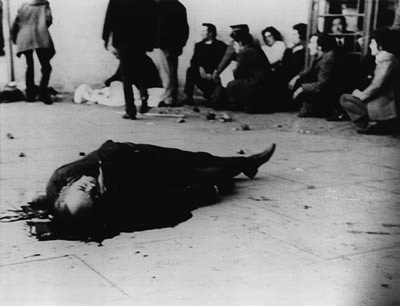
Plans to abandon or scale down a number of investigations into past British atrocities in the north of Ireland are being blamed by Stormont ministers on a cut in the British exchequer’s annual block grant for the Six Counties.
There was a furious reaction in Derry yesterday after the PSNI revealed that the Bloody Sunday murder investigation “will be losing the majority of its investigation team”.
It said the decision was due to “severe financial pressures” and would have “a substantial impact on the investigation”.
The announcement came just four days before the PSNI were due to start interviewing the soldiers who massacred 14 innocent civilians during an anti-internment march in Derry in January 1972.
“The only winners in this now are the killers,” said John Kelly, a brother of one of the victims. “This is a live murder investigation and they’ve just decided that it shouldn’t go ahead for financial reasons. Where else would a murder investigation be dropped because police are short of money?” he said.
Mr Kelly said as the Bloody Sunday killings were carried out by the British army, the Westminster government should now step in to fund the investigation rather than have it paid from the North’s subvention.
“When this investigation was established we were told that only a catastrophic event would cause it to be stopped. We were told the money was ring-fenced. But they’ve pulled the plug on it, end of story. As far as I am concerned, David Cameron’s apology counts for nothing now,” he said.
The decision was also condemned by Derry Sinn Fein assembly member Raymond McCartney, who said “access to justice should not come with a price tag”.
The PSNI has also announced that it is closing the Historical Enquiries Team (HET), a specialist police unit set up to investigate unsolved killings from the conflict. A far smaller “Legacy Investigations Branch” is set to replace the unit.
And more seriously, a cut in the Police Ombudsman’s budget has threatened the office’s investigations into more than 300 cases.
Michael Maguire, who has been ombudsman since 2012, has said that plans to launch investigations into the killing of dozens of Catholics by the notorious Glenanne gang in the 1970s, will now be “postponed”. He has also written to the Committee of Ministers of the Council of Europe to inform them that his office will in future not be able to conduct investigations in line with the European Convention on Human Rights.
DISTRESS FOR VICTIMS
Relatives for Justice director Mark Thompson said the news will cause “further distress and upset to families from across the community”.
“Simply put, the amount promised to the Police Ombudsman to investigate 340 cases is less than the hospitality budget of the NIO for the last financial year,” he said.
“Politicians continually say that victims and survivors are a priority and that they too support their efforts to resolve their cases.
“One way to demonstrate that commitment would be by ensuring that this goes beyond rhetoric and that the funds required by the Police Ombudsman are provided urgently.”
The campaigner said savings made through axing the HET could have been carried over to fund the Police Ombudsman’s office.
Theresa Kelly, whose husband Patsy Kelly was murdered in July 1974 in Trillick, said she had been given hope of discovering the truth about a murder in which members of the British Army’s UDR are suspected of being involved.
“The state has failed us time and time again. We have a right to the truth about Patsy’s murder, and the state owe us a duty to investigate Patsy’s death properly and effectively. They cannot get out of that duty.
“Now is the time to have an independent effective investigation and this should happen in my lifetime - not in 12 more years. They have failed me, and Patsy, for over 40 years”.
The family of Tommy Casey also spoke of their disappointment that his case will also be delayed. The 57-year-old Sinn Fein member was shot dead by loyalists in apparent collusion with the Crown forces.
His daughter Collette Casey last night said: “If the state had investigated these cases properly the first time we wouldn’t need to pursue them.
“We will continue to fight for the truth about how our daddy died. It now looks like it will take generations but we won’t stop. We know that there was collusion and we know the police didn’t investigate it properly and this is just another excuse to prevent an examination of the past.”
The three main routes to examine the past -- through the Police Ombudsman’s Office, the Historical Enquiries Team and the inquest process -- have always subject to political interference, legal delays, back-room manoeuvres and open sabotage.
But for many nationalists, the claims of insufficient funds are merely a new attempt to disguise the fact that a veil is being drawn over the war crimes of the British state.
The “cutbacks” in investigations are a clear sign of the failure of politicians to agree a way to deal with the past. Rhetoric about upholding the rights of victims and their families have been proven meaningless.
![[Irish Republican News]](https://republican-news.org/graphics/title_gifs/rn.gif)
![[Irish Republican News]](https://republican-news.org/graphics/title_gifs/harp.gif)

